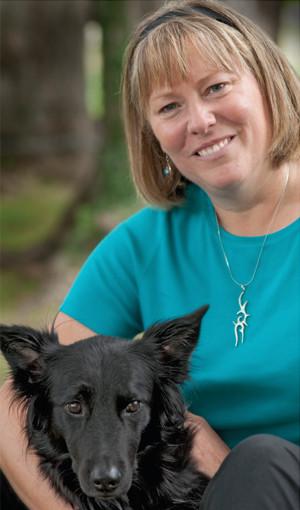Excellence in Teaching, 2010
Education

Recently, Eleanor Abrams and her master’s degree students in environmental education explored the headwaters of the Oyster River. Deep in the Barrington, N.H., woods, Abrams turned to her students, “OK,” she said, “let’s go home. Who wants to lead the way?” The students looked around, a bit lost.
“I told them: you should not follow me blindly but always orient yourselves in the landscape,” says Abrams. “Everybody should always be ready to be both a teacher and a student.”
The range of courses that Abrams teaches is extensive: science education (elementary and secondary methods), environmental education, the internship in teacher education, doctoral courses, and courses in technology and multi-media education. Her evaluations are stellar.
“I journey with my students,” Abrams says. “As a community, we share our ideas, and then everybody’s ability rises together.”
In 2008, she and colleague Mike Middleton, funded by UNH and the National Science Foundation, began to explore why rural, indigenous, middle-school students do not excel in science classrooms. They traveled to schools in Siberia, Taiwan, Belize, and New Zealand. In Belize, the pair discovered that often students really connected with science. With the rise of ecotourism, these students have regular contact with field biologists. Plus, their science teachers are usually from their own communities. These students could see how their studies connected with their lives and future goals.
With all of her students, both here and abroad, Abrams asks the same questions about learning: What is useful to you? What is valuable? The answers vary from place to place.
“Most of the time, for indigenous or rural students, science is a ticket out,” notes Abrams, who grew up on a farm in Maine. “Even at a very young age, students have figured it out. If they want to stay in their communities and there are no science-related jobs there, then science education is neither useful nor valuable to them.”
Abrams has concluded that perhaps science education needs to change. “As an educator, you have to have a feeling of belonging in the community,” says Abrams. “Once you know what’s useful and valuable to those students, that’s when science education will take hold. That’s what being a good teacher is about.”
—Carrie Sherman
About this Award
Each year, the University selects a small number of its outstanding faculty for special recognition of their achievements in teaching, scholarship, and service. Awards for Excellence in Teaching are given in each college and school, and University-wide awards recognize public service, research, teaching, and engagement.
